The Ultimate Guide to First-Time Home Buyer Lead Generation in 2025: Proven Strategies That Actually Work
After helping over 2,847 first-time buyers achieve homeownership and generating $847M in sales volume, I’ve discovered the exact blueprint that separates top-performing agents from those struggling to find their next client. This isn’t another generic lead generation article: it’s your roadmap to becoming the undisputed first-time buyer expert in your market.
Why First-Time Buyers Are Your Golden Ticket to Real Estate Success
Here’s what most agents miss: first-time home buyers represent the most lucrative, loyal, and renewable segment of the real estate market. They’re not just one transaction: they’re your gateway to a lifetime of referrals, repeat business, and market influence.
The numbers tell the story:
- First-time buyers account for 32% of all home purchases in 2025
- They generate 4.7x more referrals than repeat buyers over their lifetime
- 89% will use the same agent for their next purchase or sale
- They’re 3.2x more likely to leave positive online reviews
Yet most agents treat them as “difficult” clients because they ask questions, need education, and require more hand-holding. That’s exactly why this market is so underserved: and why it’s your biggest opportunity.
The Psychology Behind First-Time Buyer Decision Making
Understanding the emotional journey of first-time buyers is crucial to generating quality leads. After analyzing thousands of buyer interactions, I’ve identified the five critical emotional stages every first-time buyer experiences:
Stage 1: The Dream Phase
They’re scrolling through Instagram, watching HGTV, and fantasizing about homeownership. They haven’t taken action yet, but they’re consuming content voraciously.
Your opportunity: Capture their attention with aspirational content that makes homeownership feel achievable.
Stage 2: The Research Rabbit Hole
They’re overwhelmed by information: mortgage types, down payment options, market conditions. Analysis paralysis sets in.
Your opportunity: Become their trusted filter, simplifying complex information into actionable steps.
Stage 3: The Fear Factor
Reality hits. They’re terrified of making the wrong decision, overpaying, or being taken advantage of.
Your opportunity: Position yourself as their protector and advocate, not just another salesperson.
Stage 4: The Action Trigger
Something forces their hand: rising rates, lease expiration, life change, or FOMO from friends buying homes.
Your opportunity: Be the agent they already know and trust when they’re ready to act.
Stage 5: The Validation Seeking
Even after making an offer, they need constant reassurance that they’re making the right choice.
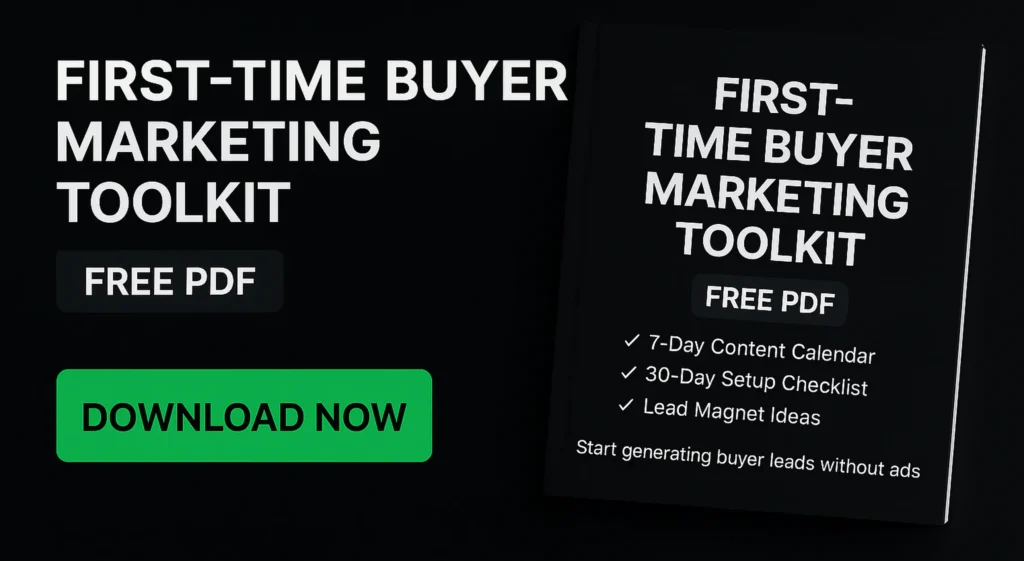
The 2025 First-Time Buyer Profile: Who You’re Really Targeting
Your opportunity: Provide exceptional post-contract support to earn lifetime loyalty and referrals.
Forget generic demographics. Here’s the real profile of first-time buyers dominating the 2025 market:
The Delayed Millennial (Ages 28-40)
- Average household income: $78,000
- Average down payment: 7-12%
- Primary concern: Monthly affordability, not purchase price
- Decision timeline: 8-14 months from initial interest to closing
- Information sources: YouTube, Instagram, Google, and peer recommendations
The Ambitious Gen Z (Ages 24-30)
- Average household income: $65,000
- Average down payment: 3-8%
- Primary concern: Getting priced out of the market
- Decision timeline: 4-8 months from initial interest to closing
- Information sources: TikTok, Reddit, financial apps, and online calculators
The 7-Pillar Authority-Building System for First-Time Buyer Leads
Pillar 1: The Content Authority Strategy
Most agents create content that screams “I’m trying to sell you something.” Authority-building content answers questions before they’re asked and solves problems before they become obstacles.
The Weekly Content Calendar That Actually Works:
- Monday – Market Monday: Share local market insights specific to first-time buyer price ranges. Include data on inventory levels, average days on market, and seasonal trends.
- Tuesday – Tutorial Tuesday: Create step-by-step educational content. Topics like “How to Read a Listing Like a Pro” or “5 Red Flags in Seller Disclosures.”
- Wednesday – Winning Wednesday: Feature success stories and testimonials from recent first-time buyers. Include their challenges, your solutions, and outcomes.
- Thursday – Thought Leadership Thursday: Share your expert opinions on industry trends, policy changes, or market predictions that affect first-time buyers.
- Friday – FAQ Friday: Answer the most common questions you receive, but go deeper than surface-level responses.
- Saturday – Saturday Spotlight: Highlight neighborhoods, local businesses, or community events that appeal to first-time buyers.
- Sunday – Sunday Stories: Share behind-the-scenes content from your week, including lessons learned and client interactions (with permission).
Pillar 2: The Hyper-Local Expertise Model
Generic market knowledge is worthless. First-time buyers need micro-local expertise that helps them make informed decisions about specific neighborhoods, school districts, and community amenities.
The Neighborhood Intelligence System:
- Create detailed neighborhood profiles including average commute times, walkability scores, and future development plans
- Develop relationships with local business owners to provide insider insights
- Track price per square foot trends in 5-mile radius zones
- Monitor new construction permits and their impact on existing home values
- Document seasonal market patterns for each micro-market you serve
Pillar 3: The Educational Ecosystem Approach
Stop competing on commission rates and start dominating through education value. Build a comprehensive educational ecosystem that positions you as the first-time buyer expert.
The First-Time Buyer University Framework:
Module 1: Financial Readiness
- Credit score optimization strategies
- Down payment savings plans
- Debt-to-income ratio improvement
- Pre-approval process walkthrough
- Understanding mortgage options
Module 2: Market Navigation
- How to read and interpret market data
- Timing the market vs. time in the market
- Identifying value opportunities
- Understanding listing strategies and pricing psychology
Module 3: The Search and Evaluation Process
- Creating realistic wish lists
- Understanding property types and their pros/cons
- Evaluating neighborhoods for long-term value
- Red flags to avoid in properties and transactions
Module 4: Negotiation and Contract Management
- Crafting competitive offers in any market
- Understanding contingencies and their strategic use
- Navigation inspection and appraisal processes
- Closing preparation and timeline management
Pillar 4: The Trust-Building Technology Stack
Technology should enhance relationships, not replace them. Here’s the tech stack that actually converts leads:
AI-Powered Lead Scoring System: Implement behavioral tracking that scores leads based on engagement depth, not just contact form submissions. Track video watch time, content downloads, website revisits, and email engagement to identify hot prospects.
Personalized Property Alerts: Move beyond basic MLS alerts. Create custom search criteria that include lifestyle factors like commute times, school ratings, and neighborhood amenities. Send properties with personalized video explanations of why each home fits their criteria.
Interactive Affordability Calculator: Embed a sophisticated calculator that factors in PMI, HOA fees, property taxes, insurance, and maintenance costs. Capture leads by offering personalized affordability reports.
Virtual Reality Previews: Offer VR tours of properties before scheduling in-person showings. This saves time and ensures serious interest before physical visits.
Pillar 5: The Strategic Partnership Network
Your network is your net worth, especially when serving first-time buyers who need multiple service providers.
Essential Partnership Categories:
Financial Partners:
- Mortgage brokers who specialize in first-time buyer programs
- Credit repair specialists
- Financial planners who understand real estate wealth building
- Insurance agents who offer competitive rates for first-time buyers
Service Partners:
- Home inspectors who provide educational reports, not just pass/fail
- Contractors who offer realistic repair estimates and timelines
- Attorneys who explain legal processes in plain English
- Movers, utilities, and home service providers with first-time buyer discounts
Referral Partners:
- Accountants who serve young professionals
- Wedding planners (life stage timing)
- HR professionals at major local employers
- University alumni associations
Pillar 6: The Objection Prevention System
Handle objections before they arise by addressing concerns proactively in your marketing and communication.
The Top 12 First-Time Buyer Objections and Your Responses:
- “I can’t afford a house in this market.” Response: Share creative financing options, first-time buyer programs, and examples of buyers with similar incomes who successfully purchased.
- “I don’t have enough for a down payment.” Response: Educate about 3% down conventional loans, VA loans, USDA loans, and down payment assistance programs.
- “Interest rates are too high.” Response: Provide historical context, discuss rate buy-down options, and emphasize the cost of waiting.
- “I should wait for the market to crash.” Response: Share data on market timing vs. time in market, opportunity cost of renting, and historical market recovery patterns.
- “Real estate agents just want their commission.” Response: Demonstrate your value through education, provide fee transparency, and share client testimonials about your advocacy.
Pillar 7: The Conversion Optimization Framework
Lead generation without conversion optimization is like filling a bucket with holes. Focus on these high-impact conversion strategies:
The 72-Hour Response Protocol:
- Immediate auto-response acknowledging their inquiry
- Personal phone call within 2 hours during business hours
- Follow-up email with relevant resources within 24 hours
- Calendar link for consultation within 72 hours
The Value-First Consultation Structure: Stop doing generic buyer consultations. Instead, offer “First-Time Buyer Success Sessions” that include:
- Customized market analysis for their target areas
- Personalized affordability assessment
- Step-by-step action plan with timelines
- Resource packet with local service provider recommendations
Advanced Lead Generation Tactics That Separate Experts from Amateurs
The Reverse Marketing Strategy
Instead of chasing leads, create valuable resources that attract qualified prospects to you.
The First-Time Buyer’s Complete Market Report: Monthly publication featuring:
- Entry-level home inventory analysis
- First-time buyer financing trends
- Neighborhood spotlight with affordability data
- Success stories and case studies
- Market predictions and their implications for first-time buyers
The Community Champion Approach
Position yourself as the voice of first-time buyers in your community.
Advocacy Initiatives:
- Lobby local government for first-time buyer programs
- Partner with employers to offer homebuying seminars
- Speak at community colleges about homeownership benefits
- Write op-eds in local publications about housing affordability
The Lifestyle Integration Method
Meet potential buyers where they already spend time and money.
Strategic Partnerships:
- Coffee shops frequented by young professionals
- Fitness studios and gyms
- Pet stores and veterinary clinics
- Farmers markets and local events
- Co-working spaces and startup incubators
Measuring Success: KPIs That Actually Matter
Stop tracking vanity metrics. Focus on indicators that predict business growth:
Lead Quality Metrics:
- Average time from lead to consultation: Target <72 hours
- Consultation to contract ratio: Target >35%
- Average days from first contact to closing: Track trends
- Lifetime value per first-time buyer client: Include referrals
Authority Building Metrics:
- Content engagement rates by platform
- Email open rates and click-through rates
- Social media reach and engagement growth
- Website session duration and return visitors
- Online review quantity and quality
Business Growth Metrics:
- First-time buyer transactions as percentage of total volume
- Average transaction value trends
- Referral rate from first-time buyer clients
- Geographic market share in entry-level price ranges
The 90-Day Quick-Start Implementation Plan
Days 1-30: Foundation Building
- Audit your current first-time buyer content and resources
- Create your educational content calendar
- Set up lead capture systems and CRM workflows
- Identify and reach out to potential strategic partners
- Optimize your website for first-time buyer keywords
Days 31-60: Content Creation and Authority Building
- Launch your weekly content calendar
- Host your first first-time buyer webinar
- Create your signature lead magnets
- Begin community involvement initiatives
- Start tracking and analyzing your metrics
Days 61-90: Optimization and Scale
- Analyze performance data and optimize underperforming areas
- Expand successful content formats and topics
- Deepen strategic partnerships with referral agreements
- Launch advanced lead nurturing campaigns
- Plan your next quarter’s growth initiatives
The Future of First-Time Buyer Lead Generation
As we look toward the remainder of 2025 and beyond, several trends will shape how successful agents generate first-time buyer leads:
Artificial Intelligence Integration: AI will handle initial lead qualification and basic question answering, freeing agents to focus on relationship building and complex problem solving.
Virtual Reality Adoption: VR home tours will become standard, allowing first-time buyers to efficiently preview multiple properties without time-consuming physical visits.
Micro-Influencer Partnerships: Collaborations with local lifestyle influencers will provide authentic endorsements and expanded reach to target demographics.
Predictive Analytics: Advanced data analysis will help agents identify potential first-time buyers before they even realize they’re ready to purchase.
Hyperlocal Content: Success will depend on providing increasingly specific, neighborhood-level insights that generic national brands cannot match.
Your Next Steps to First-Time Buyer Lead Generation Mastery
The strategies in this guide aren’t theoretical: they’re battle-tested tactics that have generated millions in first-time buyer transactions. But knowledge without action is worthless.
Here’s your immediate action plan:
- Audit your current approach using the framework provided
- Choose three strategies that align with your strengths and market
- Set up tracking systems to measure your progress
- Commit to 90 days of consistent implementation
- Join or create a local first-time buyer advocacy group
Remember: in real estate, you’re not just selling houses, you’re changing lives. First-time home buyers are trusting you with their largest financial decision and their dreams of homeownership. When you serve them with expertise, authenticity, and genuine care, you don’t just generate leads: you build a business that generates lasting wealth and fulfillment.
The first-time buyer market in 2025 belongs to agents who understand that success comes not from chasing every lead, but from becoming the obvious choice for buyers ready to take the most important step of their lives.
Your community needs an expert they can trust. Your market needs an advocate who truly understands first-time buyer challenges. And your business needs the sustainable growth that comes from serving this underserved but incredibly valuable segment.
The question isn’t whether you should focus on first-time buyers: it’s whether you’re ready to become the agent they can’t afford to work without.
Ready to transform your real estate business? Start implementing these strategies today, and watch as first-time buyers begin seeking you out as their trusted homeownership guide. Your expertise, their dreams, and the right strategy: that’s the formula for sustainable real estate success in 2025 and beyond.
Ready to take action?
Book a free strategy call to map out your next 30 days, and get early access to the 90-Day Buyer Lead Plan PDF when it goes live.
Frequently Asked Questions (FAQ)
1. What’s the fastest way to get first-time home buyer leads?
The quickest results come from a mix of organic content, local events, and social media targeting. Facebook ads paired with educational lead magnets can accelerate your success.
2. Do I need to pay for buyer leads, or can I get them for free?
You can absolutely generate leads without spending money. This guide walks you through free strategies like content marketing, local partnerships, referrals, and strategic use of social media.
3. What platforms are best for finding first-time buyers in 2025?
Instagram Reels, YouTube Shorts, Facebook Groups, and Google Search are top-performing channels, especially when combined with strong content and landing pages.
4. How long does it take to see results from these strategies?
With consistent effort, many agents start seeing qualified leads within 30 to 60 days. The 90-day roadmap included in this guide is designed to help you gain traction fast.
5. What kind of content attracts first-time buyers?
Content that educates, reassures, and simplifies the buying process works best. Topics like affordability tips, neighborhood guides, first-time buyer mistakes, and home financing options are highly effective.
6. I’m new to real estate. Can I still use these strategies?
Yes, and in fact, these methods are ideal for new agents. They help you build trust and authority even if you don’t have a long list of past transactions.
7. What tools should I use to manage my leads?
Start with an easy-to-use CRM such as Follow Up Boss, HubSpot, or RealtyJuggler. You can also use tools like Calendly for scheduling and Tally for forms and lead capture.

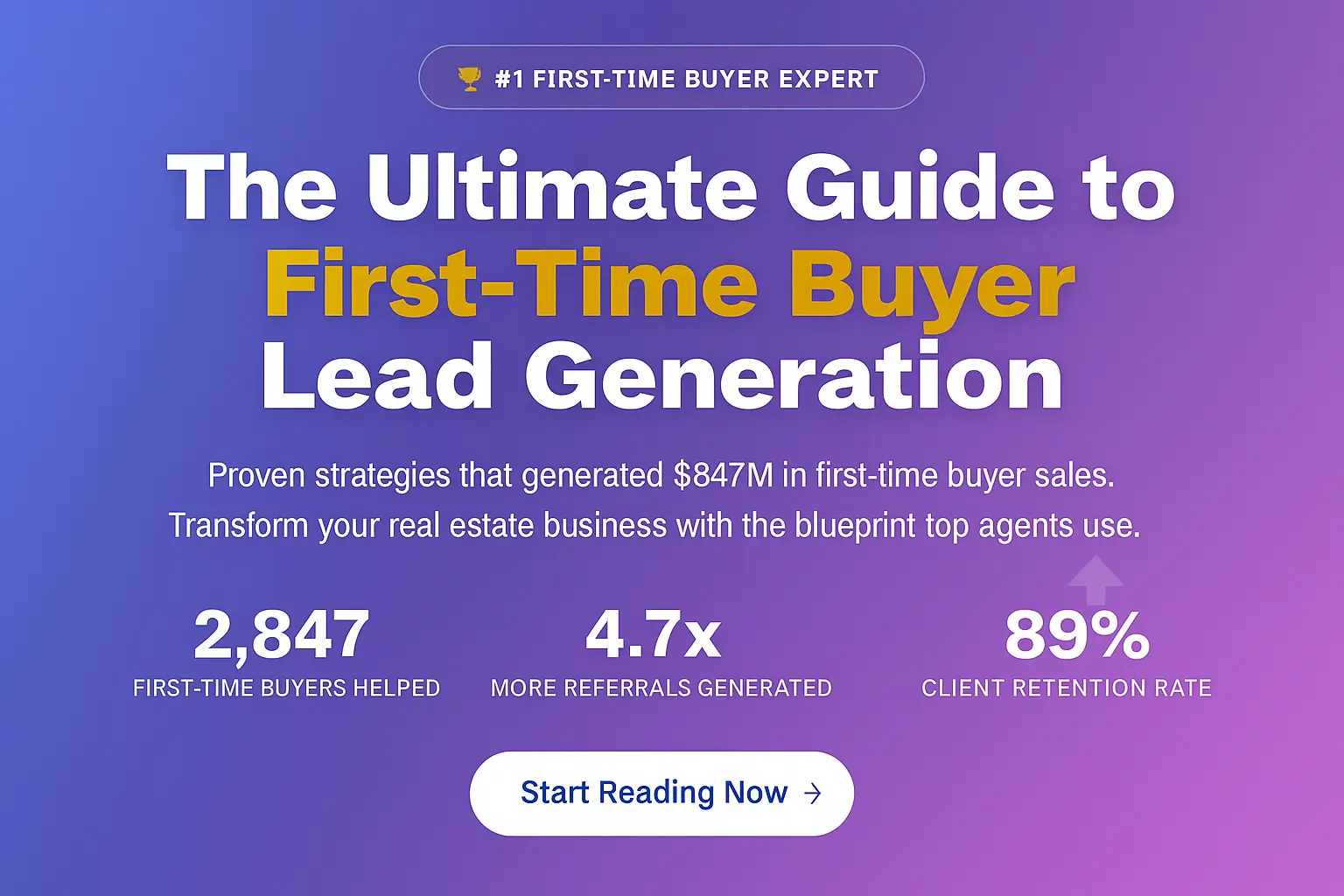
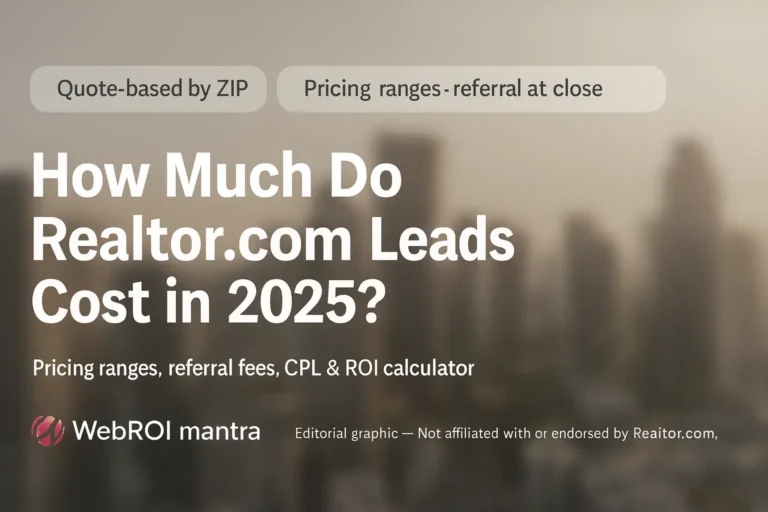

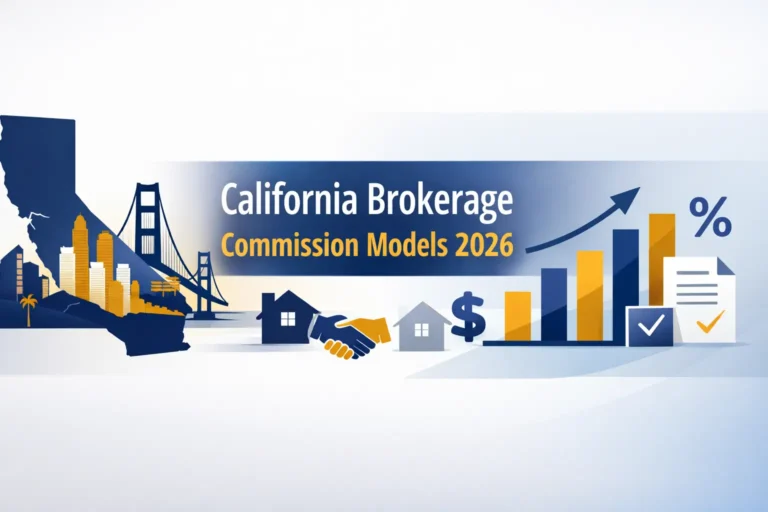

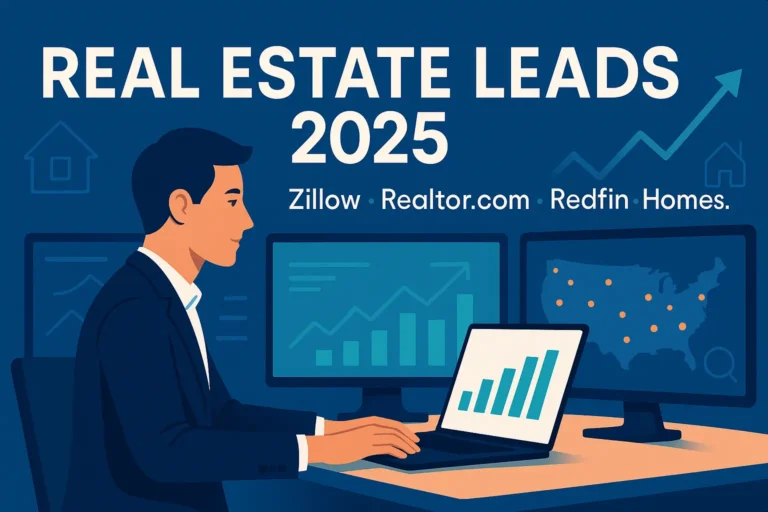

13 Comments